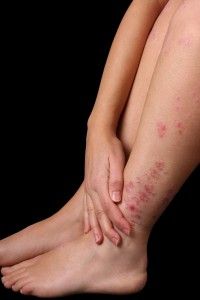Does Psoriasis Spread Via Person-to-Person Contact?
Psoriasis is NOT Contagious
Since psoriasis is primarily an autoimmune disorder, the answer to does psoriasis spread from person to person contact is no. However, psoriasis can spread all over the body once an outbreak occurs, leaving the body spotted with bright red lesions of varying sizes.
Psoriasis is not contagious. You cannot get psoriasis by being around someone with psoriasis nor can you get it by touching the lesions. It originates from a compromised immune system that allows excessive growth of skin cells, which die and accumulate on the skin in the form of thick, itchy patches. A disorder of an immune system can cause the disease of psoriasis.
A patch of psoriasis begins as tiny red bumps, usually on the elbows, legs and face but it can affect any body area. These bumps expand in size rapidly, with surface scales forming and shedding, causing extreme itching, pain and bleeding if scratched hard enough.
Bleeding occurs when scratching tears scales away from skin, which also causes the tops of capillaries to tear as well. Without immediate treatment, a psoriasis flare-up continues growing, developing into lesions known as "plaques".
Symptoms of Psoriasis Can Be Exacerbated

Symptoms of psoriasis include cracked, dry skin, swelling, uncontrollable itching and crumbling nails when psoriasis affects nails.
These issues are exacerbated by stress, smoking, alcohol, living in a cold climate, sunburn and prior skin injuries, such as scrapes, cuts and insect bites.
Sicknesses caused by bacteria or viruses will also aggravate psoriasis. Other triggers of psoriasis include hypertension medications, anti-malarial drugs and some mental illness drugs, especially lithium.
Does Psoriasis SPREAD When Treated?
No cure exists for psoriasis but treatments are effective for the majority of patients in controlling psoriasis outbreaks. The most common treatments used to combat the spread of psoriasis include:
- Topical creams, retinoids and corticosteroids
- Intense moisturizers
- Coal tar
- Ultraviolet light therapy
- Laser therapy
- Counseling for depression and anxiety
- Biologic injections
Some patients experience a complete remission of psoriasis while other find relief from debilitating symptoms but not remission. Once treatment begins, patients usually begin feeling better in two to three weeks, depending on the severity of the psoriasis.
Some areas of the body may respond better to treatment than others. Psoriasis tends to be most persistent in places where skin remains moist and warm, such as the backs of the knees, in the groin area, scalp and under the arms.
Why Does Psoriasis Spread?
Psoriasis spreads on the body because the immune system mistakenly detects normal skins cells for pathogens, or cells that are dangerous to the human body. As a result, the immune system furiously transmits signals to the epidermis telling it to start making new skin cells.
These new skin cells accumulate and die, creating psoriasis lesions. In addition, a form of psoriasis called psoriasis arthritis occurs in approximately 20 percent of people suffering from psoriasis. This happens when joint becomes inflamed by a dysfunctional immune system.
Unless immune system functioning is repaired, psoriasis plaques will continue to appear on the body as a recurring, chronic condition. However, since doctors are not 100 percent certain that psoriasis is an autoimmune disorder, treatment consists of targeting the abnormally high cell proliferation rather than the immune system.
Psoriasis Versus Other SKIN PROBLEMS
Sometimes people inadvertently allow psoriasis to spread because they think it is another type of skin disease and attempt to treat it at home. Diseases such as seborrheic dermatitis, lichen planus, ringworm and pityriasis rosea resemble psoriasis and spread like psoriasis as well.
The best way to determine whether you have psoriasis is to visit a doctor, who will examine the lesions and possibly order a biopsy to obtain a correct diagnosis. Dermatologists who can also prescribe an appropriate treatment plan to relieve psoriasis symptoms can answer how does psoriasis spread and other pertinent questions concerning psoriasis.
Does Psoriasis Spread? more information on Psoriasis
National Institute of Arthritis and Musculoskeletal and Skin Diseases
 Psoriasis en la pierna
Psoriasis en la piernaPágina de inicio
Mapa del sitio
Mapa del sitio en orden alfabético
Ein Bokek, Beach Hotel Lot, Dead Sea - Israel
